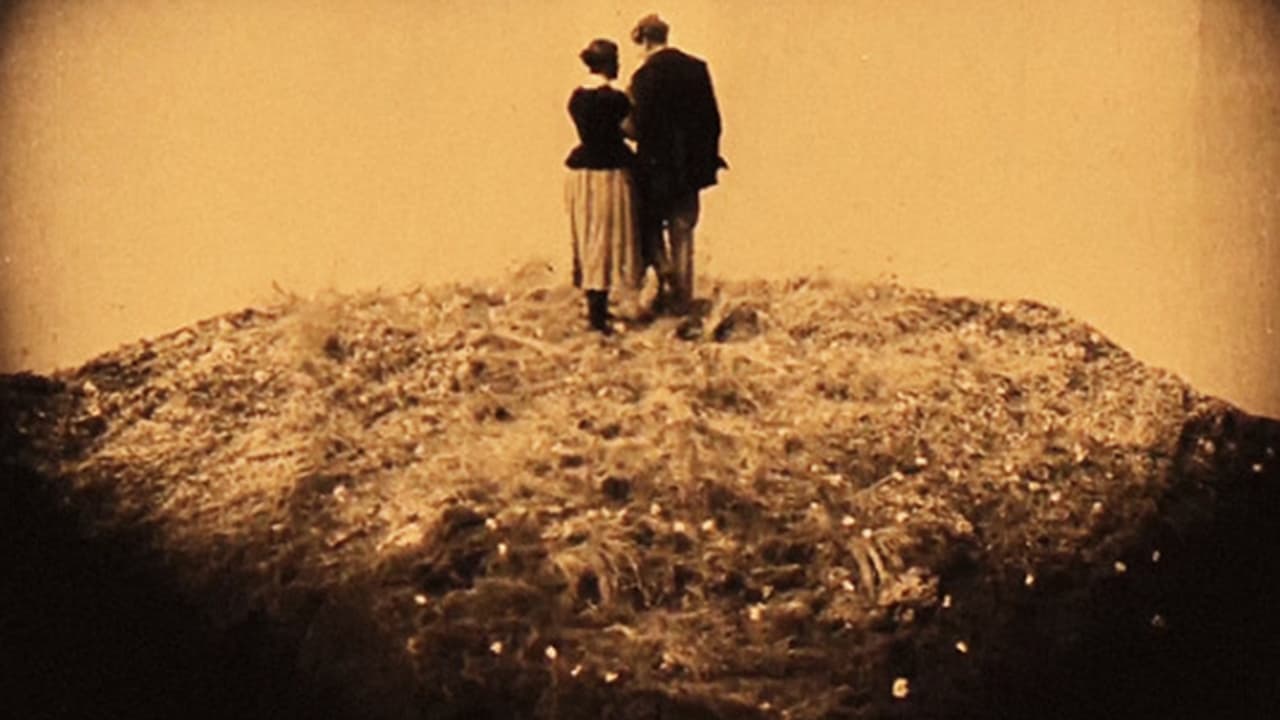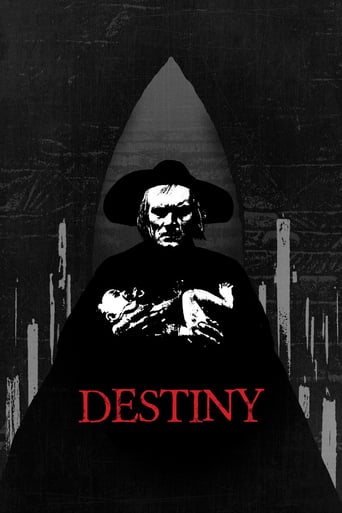Aneesa Wardle
The story, direction, characters, and writing/dialogue is akin to taking a tranquilizer shot to the neck, but everything else was so well done.
Matylda Swan
It is a whirlwind of delight --- attractive actors, stunning couture, spectacular sets and outrageous parties.
Tobias Burrows
It's easily one of the freshest, sharpest and most enjoyable films of this year.
Billy Ollie
Through painfully honest and emotional moments, the movie becomes irresistibly relatable
gavin6942
When a woman's fiancé disappears, Death gives her three chances to save him from his fate.This is the sort of movie that made an impact in its own time. Douglas Fairbanks purchased the American rights, to delay its general American release while he copied the effects of the Persian segment for his 1924 "The Thief of Baghdad". Luis Bunuel has said this is the film that got him interested in movies, and apparently Alfred Hitchcock has praised it as well.I would not praise it quite on the level either of them did. It is not Fritz Lang's best film by a long shot, nor the best film of the German Expressionist era. But still worth seeing, if for no other reason than it is a Lang film, and stars Lil Dagover, arguably the greatest actress of the Weimar period.
tylerp-275-916754
This should be a lesson to the movie makers of today who have at their disposal a range of special effects other directors never had, but they use them for moronic ideas. Der Mude Tod is amazing not for its camera tricks (such as double exposure) or for their filters that give the image a certain tint to make it more revealing, but for the brilliant use of these techniques in order to achieve an aesthetic ideal. German expressionism started to fascinate me after seeing The Cabinet of Doctor Caligari, and then I went on to see some other movies that are loosely gathered under this label. Der mude Tod may not be as spectacular as Metrtopolis but it has the power to work on many levels as well. It's hard to place this in a genre, the IMDb thought it a fantasy but it is clearly more, it's romance, drama, and even a thriller in some moments. The story is a perfect example of the expressive possibilities of cinema, as the lead characters are used in three different stories connected in a larger fourth story. Just like Dr. Caligari there's more than meets the eye with the movie even if it does get a bit childish sometimes. Speaking of which, I think that the sets are constructed as if from the imagination of a child, they are definitely not "historically accurate". This goes to show you that producers today waste their money on accuracy leaving aside storytelling and good film making. And this is for the worst. And speaking of producers it is really a pity that when he came in America Lang made all those noirs and westerns. Some of them are good, because the direction is generally well done, but I think Lang could have used his talents on better scripts.
JoeytheBrit
A young couple encounter Death in a country tavern while on a journey, and he claims the man. The man's young wife tracks Death down and pleads with him to return her husband to her. He promises to do so if she can prevent any one of three imminent deaths, each represented by a burning candle that has nearly burned out.The subject of death is a ripe one for the cinema, and probably the most famous example of a living person attempting to bargain with death is Bergman's The Seventh Seal, but this silent movie from Fritz Lang is possibly more accessible to the casual viewer. Death here is something of a sympathetic character - and he is a character rather than just a representation - slavishly following the laws laid down by God, but wishing for a release from his responsibilities. He's played here by Bernhard Goetzke, a hollow-cheeked man with searing eyes who certainly looks the part.All of the principle characters play multiple roles, perhaps to emphasise the inevitability of death for us all and the futility of attempting to escape it (or maybe to cut down on costs - who knows?) The film looks great, with some striking images and impressive sets. It's true that the film does drag a little in the second act in which three short stories are played out, taking the action away from the main story and thus bringing that part of the film to a screeching halt.Der Mude Tod is one of those films that will no doubt entrance lovers of silent or early German cinema but which is unlikely to convert many to the genre. Fritz Lang's direction is crisp and imaginative and there's something almost intangible about it that suggests a young director at the outset of his career.
Steffi_P
This early Fritz Lang picture made quite a splash among his fellow filmmakers. Hitchcock's favourite film, catalyst for Luis Bunuel's career, inspiration for many of the devices in the Douglas Fairbanks Thief of Bagdad and even one or two ideas in Powell and Pressburger's Tales of Hoffman, Der Mude Tod certainly has a lot to answer for.This was also Lang's first collaboration with wife-to-be Thea von Harbou. The influence of a more talented screenwriter is clear, as this boasts a far stronger narrative than his earlier Spiders pictures, which he penned himself. The main storyline was famously inspired by a dream that Lang once had. I've lost track of the number of times I've woken up from a dream, thinking it was a fantastic idea for a screenplay, only to realise once I was properly awake it was unworkable. Lang and Harbou have done a good job then of weaving a fairly coherent story out of what is after all the product of someone's unconscious mind. And yet there are a number of weaknesses to it. For example, why is it necessary to introduce us individually to all the town's notaries, when their identities are of so little importance to the plot? This is at the expense of the principle characters, none of whom is fully rounded.However, while Lang often failed to balance out a story, he had a real sense of structure when it came imagery and tone. Here was a director who truly thought in images and not words. If you look at Lang's greatest silent pictures, especially Metropolis, they are structured – often literally – like works of classical music, with calm passages giving way to more dynamic movements. You can see the beginnings of that trend here – the framing story in the German town is slow and appropriately dreamlike in its imagery. Then there is a sudden contrast with the burst of action that opens the story of the first light, and this frantic pace is kept up throughout the first and second stories. For this reason the third story, for all its special effects, is the weakest for me because it loses the pace of the first two and is the least tight in its construction.The individual image was also highly important to Lang. Whereas his contemporaries in German cinema were doing everything with shadows and superimpositions, Lang often achieves greater effect with his manipulation of space. He had already experimented with scenery and space in his earliest films, but by now a very definite approach is beginning to emerge. Lang often likes show us a scene from two opposing camera angles, showing us the completeness of a set and making it feel real to the audience. He is not afraid to break the line of action – switching the camera from one side of the actors to the other - generally a directorial no-no, but to be honest it only causes confusion when everything is shown in close-ups and the space where the action takes place is not well defined. In Der Mude Tod, as with many of Lang's films, every shot seems calculated to suggest enclosure and entrapment – very apt for the theme of inescapable fate. On small sets, rear walls are often at 45-degree angles to the camera, so they appear to hem in the actors, while on the larger sets the sheer cavernous size of the room makes the actors appear tiny. Even in the outdoor scenes the action is often framed by an overhanging tree.In spite of his constant attention to the architecture, Lang is now paying a bit more attention to his actors. The performances are comparatively restrained for a German silent film, with Lil Dagover resisting the temptation to slip into melodrama, and the always watchable Rudolph Klein-Rogge in the most normal, human role I have ever seen him in.In Der Mude Tod, we see the first flourishing of Fritz Lang's genius. He is just a few films away from perfecting his technique. Still, the picture suffers somewhat from the same problem as many "effects movies", in that it is an impressive show without enough substance to back it up – in this case the main defect is a lack of well-defined characters.

